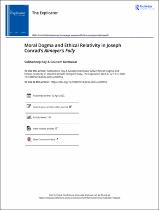| dc.contributor.author | Karmakar, Goutam | |
| dc.contributor.author | Ray, Subhadeep | |
| dc.date.accessioned | 2024-02-15T10:59:25Z | |
| dc.date.available | 2024-02-15T10:59:25Z | |
| dc.date.issued | 2022 | |
| dc.identifier.citation | Ray, S. and Karmakar, G., 2022. Moral Dogma and Ethical Relativity in Joseph Conrad’s Almayer’s Folly. The Explicator, 80(3-4), pp.127-131. | en_US |
| dc.identifier.issn | 00144940 | |
| dc.identifier.uri | http://hdl.handle.net/10566/9317 | |
| dc.description.abstract | This paper studies the intricate treatment of the abstract and dogmatic order of imperial, racial, and religious morality, and the issue of ethical commitment in the concrete and fleeting relationships between individual subjects in Joseph Conrad’s debut novel, Almayer’s Folly (1895). The novel is set in the Malay Archipelago, where the fading years of the imperial absolutism of Europe give way to conflicting trade and political interests. A pessimistic philosophical outlook in Conrad’s text shows how all the overindulgent narcissistic moral orders accommodate hate and self-interest motivated conspiracy, and simultaneously violate ethical demands of the Other in human contact. | en_US |
| dc.language.iso | en | en_US |
| dc.publisher | Routledge | en_US |
| dc.subject | Morality | en_US |
| dc.subject | Ethics | en_US |
| dc.subject | Empire | en_US |
| dc.subject | Race | en_US |
| dc.subject | Moral dogma | en_US |
| dc.title | Moral dogma and ethical relativity in joseph conrad’s almayer’s folly | en_US |
| dc.type | Article | en_US |

